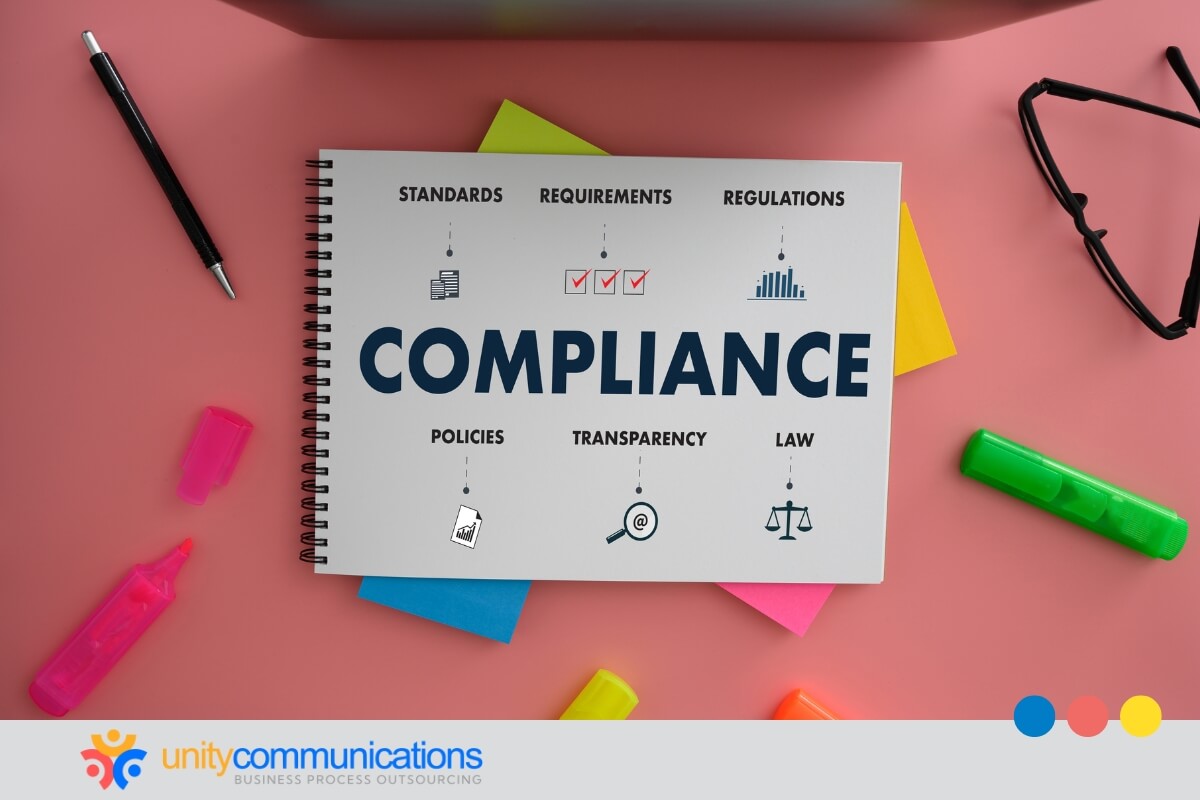Table of Contents
Learn more about outsourcing services for Phoenix businesses. Watch the video below.
Compliance has become challenging for medical facilities in Phoenix, Arizona, due to the evolving industry and growing cyber threats. Thus, many practices in the city rely on business process outsourcing (BPO) to effectively handle compliance requirements.
If you are considering hiring a BPO company in Phoenix but are unsure about its benefits, continue reading.
This article discusses the importance of industry regulations, the challenges organizations face in adherence, and ways outsourcing supports healthcare compliance.
Importance of Regulatory Compliance in Healthcare

Like other healthcare organizations in the U.S., practices in Phoenix follow various regulations that govern their operations. These cover many topics, including patient privacy, medical coding and billing, and clinical trials.
Understanding and complying with these regulations helps ensure quality patient care and ethical procedures. They promote transparency and accountability through the following measures:
- Public reporting requirements demand healthcare facilities to publicly report specific metrics, such as patient satisfaction, infection rates, and medical errors.
- Disclosure requirements oblige medical facilities to share information about their financial relationships with other healthcare organizations.
- Audits and inspections ensure healthcare facilities comply with regulations that allow for safe and quality care.
- Whistleblowing protection encourages medical workers to report violations made by their organizations.
Most importantly, healthcare regulations help prevent the unauthorized access, use, or disclosure of sensitive patient and organizational information. They protect all parties from fraud, abuse, and threats of data breaches.
However, managing regulatory compliance is already a huge undertaking. With more people moving to and visiting Phoenix as a growing healthcare hub, local organizations may struggle to keep up with compliance requirements.
Here are some of the challenges healthcare organizations face in regulatory compliance:
- Complexity and diversity of regulations. Healthcare regulations and frameworks constantly change at the federal, state, and local levels. Keeping up with these changes and ensuring compliance can be significantly challenging.
- Rise of cyber threats and attacks. Protecting patient health information (PHI) is at the core of many regulations. Thus, data breaches are a major concern for the Phoenix healthcare industry. In 2022, a cyberattack on Valle des Sol Community Health’s systems exposed over 70,000 patient information.
- Budget constraints. Smaller medical practices might struggle to keep up with streamlining regulatory compliance costs. Resources, technology, training, and audits are necessary investments for enhanced compliance.
- Staff shortage. Considering Arizona’s worsening medical staff shortages, higher patient volumes challenge medical professionals to consistently provide competent care. With their attention divided, healthcare workers might not have the time and energy to focus on compliance requirements.
- Lack of training and education. With complex regulations, budget constraints, and staff shortages, training medical workers in regulatory compliance might be tricky. Inadequate training increases the risks of noncompliance and violations, which can lead to penalties and fines.
Given the circumstances in Phoenix’s medical and cybersecurity landscape, organizations increasingly rely on healthcare BPO services for competent support in regulatory compliance.
Five Ways Outsourcing Supports Healthcare Compliance
Outsourcing involves organizations subcontracting non-core functions, such as managing compliance requirements, to third-party staff. Many medical facilities turn to outsourcing since it is less expensive than hiring an in-house team.
Additionally, healthcare BPO providers employ experts with proven expertise in regulatory compliance processes and standards. These professionals possess the following certifications:
- Certified in Healthcare Compliance (CHC)
- Healthcare Compliance Research Certification (CHRC)
- Certified Compliance and Ethics Professional (CCEP)
- Certified Healthcare Privacy Professional (CHPP)
- Certified Information Privacy Professional (CIPP)
Additionally, BPO companies leverage advanced technology to accomplish outsourced tasks. These innovations include artificial intelligence (AI), machine learning (ML), natural language processing (NLP), blockchain, and robotic process automation (RPA).
These capabilities help organizations better maintain adherence and enhance efficiency. For a more detailed overview, below are five ways outsourcing supports practices with healthcare compliance.
1. Expert Industry Knowledge
BPO teams managing healthcare regulatory compliance are proficient in all related processes and tasks. They are also well-versed in the different federal and state laws that medical organizations follow, helping ensure compliance.
Here are some federal and state regulations Phoenix-based hospitals and clinics comply with:
- The Health Insurance Portability and Accountability Act of 1996 (HIPAA) sets a foundation for protecting sensitive patient data. It requires medical facilities to ensure the confidentiality and security of patient information, both in electronic and paper formats.
- The Health Information Technology for Economic and Clinical Health (HITECH) Act supplements HIPAA. It focuses on improving electronic health records (EHRs) security and privacy. It also mandates stricter penalties for data breaches.
- Centers for Medicare and Medicaid Services (CMS) require Phoenix-based practices that accept their programs to comply with their regulations. These cover medical recordkeeping, billing and coding, patient care quality and safety, fraud and abuse prevention, and HIPAA compliance.
- The Emergency Medical Treatment and Labor Act (EMTALA) requires medical facilities to provide emergency care to anyone in need, regardless of their ability to pay.
- The False Claims Act (FCA) prohibits healthcare organizations from submitting false claims for service reimbursement or requests from patients not eligible for coverage. It also forbids using fraudulent records or statement materials to make a claim.
- The Stark Law prohibits Medicare or Medicaid physicians from referring patients to designated health services (DHS) providers with whom they have financial relationships. These DHS organizations include hospitals, clinics, laboratories, and imaging centers.
- The Anti-Kickback Statute (AKS) prohibits individuals from exchanging valuable items for patient referrals or services payable by federal healthcare programs. The AKS protects patients from unnecessary or overpriced services.
- The Arizona Medical Practice Act (AMPA) is the state counterpart of HIPAA. It covers ethical standards requiring facilities to provide competent care. It also includes patient insurance and benefit verification.
- The Arizona Hospital Licensing Act (AHLA) requires hospitals and clinics to inform patients of their estimated financial responsibilities before receiving care.
- The Arizona Nursing Home Licensing Act (ANHLA) requires nursing homes to provide patients with an estimate of their financial responsibilities before they move in.
- The Arizona Health Care Cost Containment System (AHCCCS) is the state’s version of Medicaid. It strictly requires healthcare organizations to ensure patients are informed of their financial responsibility and receive the benefits they are entitled to.
2. Efficient Claims Analysis
Claims analysis is critical in the healthcare revenue cycle. Organizations can maximize reimbursements by ensuring they are accurate, complete, medically necessary, and compliant.
Here are different ways outsourcing support for healthcare compliance can streamline claims analysis:
- Identifying and correcting any errors in claims submissions before they are forwarded
- Ensuring compliance with all applicable laws and regulations related to claims submissions
- Investigating potential fraud and abuse related to claims submissions, such as upcoding, unbundling, duplicate billing, and phantom billing
- Developing and implementing improved claims compliance programs
- Automating tasks for high-risk claims identification and audits
- Enforcing enhanced billing and coding procedures
Ultimately, these strategies help reduce the risk of claims denials, avoid compliance violations and penalties, and improve the organization’s overall financial health.
3. Improved Risk Assessment and Management
Risk assessment and management are vital for successful and sustained healthcare regulatory compliance. They help identify and control flaws in the organization’s efforts, preventing penalties for noncompliance.
With specialists on the job, healthcare practices can streamline the entire risk assessment and management processes, specifically by:
- Listing potential risks by identifying assets and vulnerabilities. Assets include patient information, financial resources, and intellectual properties. Vulnerabilities are areas potentially exposed to fraud and abuse.
- Assessing the likelihood and impact of risks. This process considers the organization’s compliance history, industry sector, size, geographic location, and financial health.
- Developing and implementing risk management strategies. This phase includes revising policies and procedures, implementing new training programs, conducting regular audits, and purchasing insurance to prevent and mitigate risks.
- Monitoring and updating risk assessment and management strategies. Doing this helps ensure that systems are accurate and up-to-date with organizational changes.
4. Advanced Security Protocols
Reinforcing confidentiality and privacy measures is one of the many ways outsourcing supports healthcare compliance. These are essential steps any medical practice must take to further safeguard sensitive data from unauthorized personnel.
Third-party professionals can help healthcare facilities improve confidentiality and privacy with their expertise, resources, and objectivity. They offer the following services:
- Data encryption protects healthcare organizations’ data from unauthorized access, even if it is stolen or lost.
- Security information and event management (SIEM) systems monitor networks and systems for suspicious activity.
- Intrusion detection systems (IDS) detect and block unauthorized access to networks and systems.
- Access control restricts who has access to organizational data.
- Audit trails track who has accessed your data and what they have done with it.
- Incident response plans outline the steps facilities can take during a data breach or other confidentiality or privacy incident.
- HIPAA compliance training ensures all medical staff know the different requirements and regulations of the most impactful federal law for healthcare.
- Safe patient record disposal prevents any risk of data breaches or unauthorized access to sensitive patient data.
5. Robust Data Breach Prevention
Data breaches negatively impact healthcare organizations through financial penalties, reputational damage, and legal liabilities. With the growing cyber threats and attacks in Phoenix, facilities must find ways to comply with PHI privacy regulations.
Fortunately, healthcare process outsourcing provides facilities with comprehensive support in healthcare compliance and data breach prevention.
Through objective risk assessment, third-party compliance specialists can identify potential threats and determine areas for organizational improvement. With the insights gathered from risk assessments, they can develop measures to prevent data breaches.
Here are some ways outsourcing support for healthcare compliance helps prevent data breaches:
- Information technology (IT) infrastructure security. Third-party specialists can help implement and manage security technologies such as firewalls, IDS, and data encryption. These systems detect and block unauthorized access and protect the privacy of stolen and lost data.
- Organizational network and system monitoring. Outsourcing compliance allows practices to check for suspicious activities indicating a potential data breach. Third-party organizations accomplish this by implementing and managing SIEM systems.
- Data breach response. If a data breach does occur, the BPO support staff can help organizations respond swiftly and effectively to minimize damage. Mitigation measures include notifying affected individuals, investigating the breach, and preventing future violations.
How Outsourcing Other Functions Helps With Healthcare Compliance

This section explores other ways outsourcing supports healthcare compliance. Other BPO services for healthcare can indirectly streamline regulatory compliance.
Below are commonly outsourced functions and how they can help improve healthcare compliance:
- Administrative tasks. Scheduling, billing, claims processing, and other executive tasks can be time-consuming, especially for growing Phoenix practices. Outsourcing these functions can free up internal staff to focus on compliance, reducing the risk of errors.
- IT support. Secure and updated technologies help medical facilities reduce the risk of data breaches and maintain compliance with EHR regulations. Outsourcing IT support provides organizations with a team of experts who help execute these measures.
- Human resources (HR). Adequate training and vetting of employees are requirements in labor laws and regulations. With outsourced HR functions, facilities can ensure and maintain compliance with requirements.
- Finance and accounting. One way outsourcing financial tasks supports healthcare compliance is through accurate financial reporting and billing. It reduces the risk of nonadherence to CMS regulations and other financial standards.
Consequences and Penalties for Noncompliance

Whether intentional or not, noncompliance with the different federal and state healthcare regulations covering Phoenix practices has consequences. These can vary depending on the law violated, the severity of the offense, and the jurisdiction in which it occurred.
Some of the expected consequences include:
Financial Penalties
The Arizona Department of Health Services (ADHS) or other regulatory bodies can fine medical organizations with compliance violations. Depending on the infraction and agency, fees can range from $100 to over $1 million.
For example, the ADHS and Arizona Medical Board impose fines of up to $25,000 per violation, while the Arizona Board of Nursing starts penalties at $10,000.
Banner Health in Phoenix recently paid the U.S. Department of Health and Human Services (HHS) a fine of $1.25 million for HIPAA violations. Its case dates back to 2016 when a cybersecurity breach compromised the data of over 3 million patients.
Suspension or Revocation of Licenses
Though it is not the first step regulatory bodies take in instances of noncompliance, license suspension or revocation is a severe consequence. With this penalty, healthcare organizations can no longer provide certain services or operate depending on the violation.
Medical facilities can still appeal the decision, but the process can be complex and time-consuming. The penalty could significantly impact the organization even before the reversal is approved.
License suspension or revocation can lead to financial losses and reputational damage, which harms the organization. Thus, complying with healthcare regulations is the best way to avoid costly consequences.
Criminal Prosecution
Healthcare facilities that do not comply with governing healthcare laws and regulations will be tried under legal process if their offenses are severe and widespread. The trial can lead to imprisonment.
Here are common violations that lead to criminal prosecution:
- Patient harm occurs when organizations provide inadequate medical care or engage in unsafe practices. Negligence, reckless endangerment, assault, battery, or medical malpractice are the standard criminal charges for this violation.
- Healthcare fraud is when organizations intentionally submit false or misleading information to government agencies or insurers to obtain unjust payment. Felony is often the legal charge for this violation.
- Patient privacy violations happen when medical facilities fail to comply with laws protecting patient privacy, such as HIPAA and AMPA. Breach of confidentiality, identity theft, and fraud are typically the charges made for this violation.
- Systematic violations are when organizations commit the same offense three times or more in two years. The criminal charges for this type of violation depend on the severity and reach of the crimes.
Reputational Damage
Probably the most encompassing and impactful consequence of noncompliance is reputational damage. Whatever penalty healthcare organizations receive can tarnish their standing in the industry.
Fines and penalties negatively impact the facility’s relationships with patients, partners, government agencies, and regulatory bodies. Additionally, healthcare organizations with a damaged reputation might find recruiting and maintaining employees harder.
One of the practical ways to avoid these consequences and penalties is to outsource support for healthcare regulatory compliance. The healthcare process in BPO leverages expertise and technological advancements to assist organizations in streamlining and maintaining compliance.
The Bottom Line
Effective ways outsourcing supports healthcare compliance include providing expertise, improving risk assessment and management measures, and so much more. With myriad benefits in operational efficiency and data security, outsourcing regulatory compliance has become attractive to many Phoenix medical practices.
Let’s connect if you need a BPO firm to help with regulatory compliance requirements. Unity Communications has over 10 years of experience in healthcare process outsourcing. Thus, you can rely on us for dependable services.




